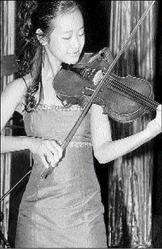Pan in Harmony produces happy evening
Published: Wednesday | July 8, 2009

Jessica Yap, as usual, performed splendidly. - Photo by Colin Hamilton
After many months of training and rehearsing, the Stella Maris Steel Band on Sunday presented its first major concert, Pan in Harmony, at Stella Maris Church, Shortwood Road.
The three-hour-long function, cocktails and intermission included, was an unequivocal success. It was well attended, the 24 items received continual applause and there was a standing ovation at the end.
Apparently, the organisers of the programme foresaw the standing ovation. Twelve pieces were listed in the printed programme for the first half, but only 11 for the second half. When patrons called for more after the ostensibly final item, Pan in Harmony, composed by the famous Trinidadian calypsonian Aldwin 'Lord Kitchener' Roberts, the band quickly served up the 'brawta'. It was A Little More Oil in My Lamp, and it brought the total number of pieces to an even 24.
Members of the 16-strong band - with all but one member, Dwight McBean, being female - looked understandably pleased when the concert ended. As the emcee, Andrew Lawrence, pointed out, the band had been working "extremely hard" in preparation for the concert.
First production
The Gleaner was told by Gay Magnus, the bandleader, trainer and chief composer, that Pan In Harmony was the band's first production. Until Sunday, she said, the band had only played in productions by other people.
The band's listed guest artistes on Sunday were violinist Jessica Yap and singers Rory Baugh, Carole Reid and Lawrence, the emcee. There was also a surprise perform-ance by Keith Lyn, once the lead singer for the renowned Byron Lee and the Dragonaires band, who accompanied the Stella Maris Band for Moon River on his chromonica (a instrument like a large harmonica). He even sang a couple of verses of that Henry Mancini hit.
The song won an Academy Award for Best Original Song in 1961 and the album in which it was included won a Grammy the following year. That information was one of several tidbits found in the printed programme.
In his opening remarks, Lawrence told the audience that packed the hall to prepare to be swept off their feet by the band. His prediction was almost right as many of the tunes had patrons dancing.
One of the attractive features of the programme was its variety. Not only did the band play different types of music - sacred, classical, calypso, R&B, soca and reggae - but the guests, too, brought different styles and talents to the show.
Soaring soprano
Reid's first song, delivered in her clear, soaring soprano voice, was Climb Every Mountain. She was accompanied on piano by Dwight McBean, who also played pan in the steel band. Later, accompanied by the band, Reid returned with Love Changes Everything, and later still, she teamed up with Baugh to sing the lyrical Italian-English hymn to God, The Prayer.
Lawrence's rich baritone gave one kind of pleasure while Baugh's sublime tenor gave another; and the same could be said of their initial songs, Wonderful World and Ave Maria (Schubert's), respectively.
Yap, the other scheduled guest, was introduced by Lawrence as "very special." When she was seven, he said, she became the youngest person in the Caribbean to gain a distinction in the grade- five theory Associated Board of the Royal Schools of Music (ABRSM) exams and now, at only 16, she has earned her Licentiate of the Royal Schools of Music (LRSM). Yap also did well over the past year at Campion College, as she got the Principal's Award.
The young violinist lived up to the glowing introduction. Informing the audience she was told to deliver "something lively and upbeat," she proceeded to play I will Survive and Jammin. But as her hundreds of fans will attest - for she has been entertaining audiences for years - she dances around her performing space almost as much as her bow dances over her violin.
Sunday's audience showed its appreciation at four levels - with polite applause, enthusiastic applause, applause with cheers and standing ovation. Yap's set earned her a standing ovation by half the house. (The full-house standing ovation was to come at the end of the concert.)
Though not all the pieces played by the band were of a uniformly high standard - a few had a decidedly amateur sound, suffering from poor arrangement or monotonous playing, or both - most were good and gave proof that a steel band can deliver music with colour and texture.
Band at its best
An example of the full band at its best was its accompaniment of Baugh singing the gentle and complex Ave Maria, but there was also subtlety to be found in the fast-paced Tico Tico No Fuba which was played by two master pannists, Magnus and David Aarons, both pan-music instructors. Translated, the title of the Brazilian tune (composed by Zequinha de Abreu) means "tico-tico [a bird] on the cornmeal".
Some other well-received items by the band were the instrumental calypso piece by the Troubadours of Barbados, Talk, which featured a quarter of the pannists; the 1960s Drifters' hit Under The Boardwalk; a Jamaican hit of the same time period, Eastern Standard Time, by the troubled genius Don Drummond; and Kitchener's lively Mamma Dis Is Mas. Tidbit on the last named: The arrangement of that calypso was done by legendary steel pan innovator, Anthony Williams of Trinidad and Tobago, who, in 1964, won the Panorama Steelbands competition with the arrangement.
The Gleaner heard from two sources that, because of initially slow ticket sales, the organisers had feared the turnout might have been poor. Fortunately, for both organisers and patrons, this was not so.























